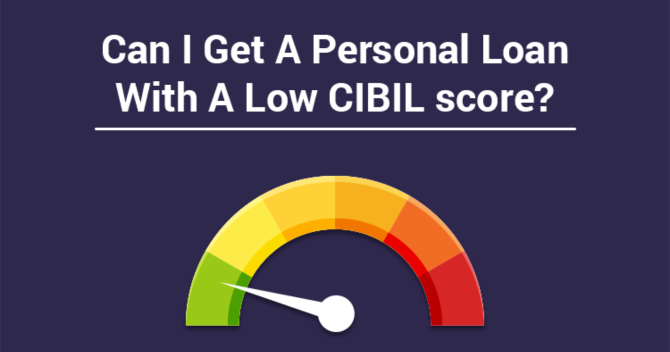You will discover the drawbacks or drawbacks of having a poor Cibil score when you are applying for a personal loan in this post. There may be instances where sudden expenses or urgent requirements call for immediate financial assistance. Personal loans could work well in certain situations to meet your financial needs. It’s critical to understand that a borrower’s creditworthiness, as determined by their CIBIL score, has a substantial impact on the personal loan approval process.
A good CIBIL score makes it easier to get a loan approved more quickly and potentially at better conditions. However, obtaining a loan with favorable terms may be difficult if you have a poor CIBIL score. putting a focus on the necessity
What is a CIBIL Score?
A CIBIL score is a three-digit numerical representation of any individual’s creditworthiness. Ranging from 300 to 900, a higher score indicates a better credit profile. Financial institutions, including banks and Non-Banking Financial Companies (NBFCs), consider this CIBIL score to assess an individual’s creditworthiness while approving loans. Since this score is required to secure a loan at good terms, it is advisable to maintain a healthy CIBIL score by following basic healthy financial habits.
However, if you currently have a lower CIBIL score and require a Personal Loan you might face some challenges. Financial institutions are more hesitant to approve loans for individuals with poor credit scores as it increases the risk associated with repayment.
If you need a Personal Loan with a bad CIBIL score, here are some of the challenges that you might face:
High-Interest Rates
Lenders view borrowers with low credit scores a high risk. They frequently make up for the risk by levying higher interest rates on Personal Loan. This indicates that even if a person is successful in obtaining a Personal Loan despite having a poor CIBIL score, they may wind up paying a lot more in interest over the course of the loan.
Reduced Loan Amounts
People with low CIBIL scores sometimes receive smaller loan amounts, even if their loan application is accepted. To limit their potential losses, lenders are hesitant about making large loan amounts to borrowers with bad CIBIL score.
Stringent Terms and Conditions
For borrowers with bad credit scores, financial institutions may apply strict terms and conditions. Shorter repayment terms, greater prepayment fees, and stricter collateral requirements can all contribute to this, making it harder for borrowers to successfully manage their loan obligations.
Limited Flexibility
Loan repayment alternatives may not be flexible for borrowers with low CIBIL ratings. Borrowers may have less influence over their financial obligations if lenders exclusively provide fixed repayment plans.
Also Read :- Top 8 Unknown facts about CIBIL Score
Minimum CIBIL Score for a Personal Loan
Traditional lenders may be hesitant to offer Personal Loans to individuals with low CIBIL scores. However, some of the leading NBFCs offer Personal Loans to individuals who have a low CIBIL score. The minimum CIBIL score required for Personal Loans ranges between 720 and 750. A score below this might secure you a loan but with higher interest rates and unfavourable terms.
Credit Success is aware that a low CIBIL score does not always indicate a person’s capacity to repay a loan. In order to meet their financial demands, we provide Personal Loans for those borrowers who have a low CIBIL score. At Credit Success we are aware of the difficulties people with low credit have in managing their finances, regardless of CIBIL score, everyone should have the chance to meet their financial demands. Personal Loans from Credit Success can be tailored to fit the various needs of borrowers.
People can build their credit profile over time by selecting the correct lender and handling their loans responsibly, which can open doors to better loan conditions in the future. Here are some pointers for increasing your credit score:
Regularly Check Your CIBIL Report
You must frequently review your credit report to keep a track of your credit score. Check for errors, fraudulent activity, or outdated information that could be negatively affecting your score. Dispute any inaccuracies you find in order to boost your credit score.
Pay Your Bills and Other EMIs On Time
This is one of the most crucial things you can do to increase your credit score. All of your bills must regularly be paid on time. Priority must be given to paying off all obligations, including credit card balances, EMIs, and other outstanding debts, by the deadlines. This helps in increasing your credit score by demonstrating your dependability in managing credit and fiscal responsibility.
Keep Your Credit Utilization Low
Your credit utilization ratio, which is the amount of credit you’re using compared to your total available credit, plays a crucial role in your credit score. So, try to keep your credit utilization ratio below 30% by paying off your outstanding balances.
Diversify Your Credit Mix
Having a mix of different types of credit, such as credit cards, installment loans, and mortgages, can positively impact your credit score. Please ensure take only those credit that you can manage responsibly.
Be Cautious with Credit Applications
Each time you apply for credit, it generates a hard inquiry on your credit report, which can slightly lower your score. Limit credit applications to when you genuinely need credit and space them out over time.
Conclusion
In conclusion, having a low CIBIL score can be detrimental when it comes to obtaining a Personal Loan. It limits the borrower’s access to credit and leads to higher interest rates, reducing affordability. Additionally, it can hamper financial opportunities and make it challenging to meet urgent financial needs. Therefore, it is crucial to maintain a good credit score to ensure favourable loan terms and enhance overall financial well-being.

